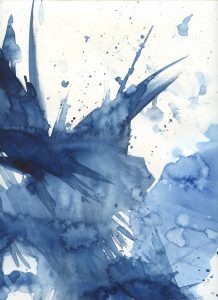
At the Curling Rink
I can no longer feel my feet. Even at 13, in my thin-soled sneakers,
the world wore an ominous grin. Here, in this weird bowling alley,
was a case in point. My father—still in his polished work shoes,
necktie tucked into his shirt, the flaps of his orange, fur-lined hat
pulled down—crouches over the granite stone. His gloved hand
grips the handle, one knee on the ice, his head bowed as if lost
in a prayer of contrition. He glances up, left and right, at his teammates
ready with their brooms. They nod. He pushes himself forward,
the stone moving with him just below his chin. He releases the stone
as if ejecting in slow motion some heavy part of himself. Sweep!
calls the captain to the sweepers. They scoot sideways with the creaking
slide of the stone, smacking the ice like a demented clean-up crew.
At the time, I could not fathom why my father and the men—
who rarely talked—were utterly absorbed in a sport in which
almost nothing happens. Still, it was hypnotic. I knew then my role
in life would be to take note, to observe. I’d need to come up with a plan
to appear normal, to go on living in this icy theatre of the absurd,
in the glare of the rink neon, my toes frozen, while heavy round stones
float dream-like toward the colored rings of the target.
Shuffleboard was thrilling by comparison. I still see
the smoke of my father’s breath clouded above him,
still hear the slap–slap of the brooms on the ice, the captain shouting
Sweep! or Halt! followed by the loud clack! of colliding stones.
Once, under winter stars, walking back to the car, his gloved hand
in my gloved hand, I asked, Who won? They did, he said.
Has our team ever won? He smiled, looked at me and said nothing.
Then: Let’s just the two of us go grab a burger and a shake.
Edward Harkness
Review by Massimo Fantuzzi
With young eyes, we follow Father at the curling rink. Every detail speaks volumes of the reverence he deserves: virtually omnipotent and capable of complex calculations, he’s exercising limitless authority over the stone like over planets and moons floating “dream-like“ under his touch “as if ejecting in slow motion some heavy part of himself“ and like over his obedient army of sweepers.
The magic of the ritual doesn’t last long, and the poet wastes no time in telling us that, in reality, “almost nothing happens“ here. Almost nothing, because something has happened: our team has lost, again.
Father’s silence is an admission of failure and shame that matches his almost reparatory offer. Something clicks: the roles have changed. We’ve all been there; we probably could have done without; we’ve probably thought—I’m not ready for this. There was no choice. The moment we all remember in every detail, the moment Father has needed our support for the first time, the moment his were the eyes that asked us to be comforted. Theatre of the absurd, authentic story, authentic life, a coming of age.
Review by Dave Mehler
In this poem we follow a brief depiction characterizing the relationship between a father and son, also offering a heady, loving and near perfect description of the sport, all in a scene where almost nothing happens, the son learns his calling, to take note, observe. Which is one way of looking at the biggest part of the poet’s calling. If half is language and metaphor, surely the other half is paying attention and seeing what others don’t? Through these descriptions I get a sense of the sacred and holy in this scene, along with gentle absurdity, commonplace liturgies, and community. He says after discovering his vocation to take note that further he’d need to come up with a plan to appear normal. Good luck with that! This portrait of a son accompanying father to a sports event of Curling ends like most church services: to go out for food afterward and “grab a burger and shake.” Lovely.
Review by Jared Pearce
To children, I’m sure, the rituals and interests of adults are mysterious and, let’s face it, probably a waste of time. Nevertheless, we adults persist—even in the reading and writing of poems. My favorite part of this poem is the bewilderment the speaker feels as a child watching curling, and, even more delicious, his understanding his role as observer and recorder. And just when I think the roles are set and the poem can go about its business, it becomes an adult itself, smiles at its own consideration of priority, and, despite the loss and series of losses, the speaker and the father go to celebrate. I wonder if the celebration is the connection between the father and speaker, a connection that I think sport is really built to create and which it too often fails to forge.
